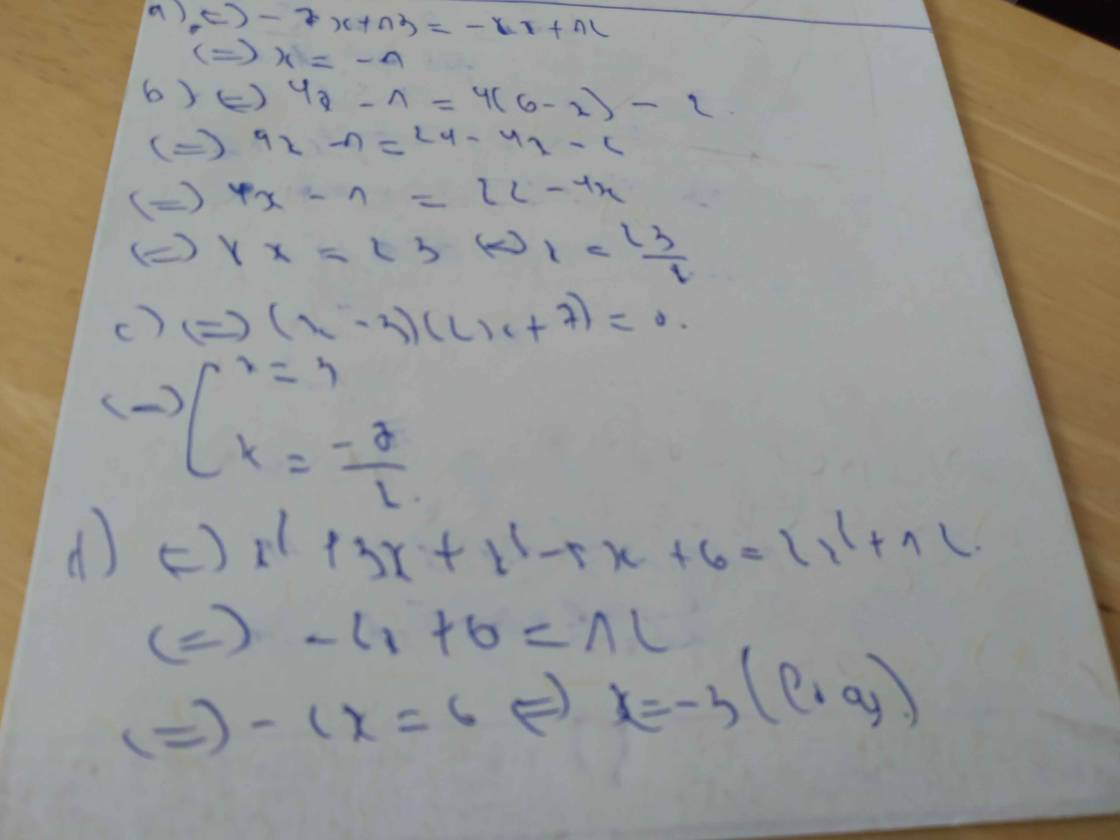Hãy nhập câu hỏi của bạn vào đây, nếu là tài khoản VIP, bạn sẽ được ưu tiên trả lời.

a) \(\left(2x-3\right)\left(2x+3\right)=0\)
\(\Rightarrow\left[{}\begin{matrix}x=\dfrac{3}{2}\\x=-\dfrac{3}{2}\end{matrix}\right.\)
b) \(x^2-1=0\Rightarrow\left(x-1\right)\left(x+1\right)=0\)
\(\Rightarrow\left[{}\begin{matrix}x=1\\x=-1\end{matrix}\right.\)
c) \(x^2-9=0\Rightarrow\left(x-3\right)\left(x+3\right)=0\)
\(\Rightarrow\left[{}\begin{matrix}x=3\\x=-3\end{matrix}\right.\)
d) \(\Rightarrow\left(2x-4\right)\left(2x+4\right)=0\)
\(\Rightarrow\left[{}\begin{matrix}x=2\\x=-2\end{matrix}\right.\)
2) \(\Rightarrow\left(5x-3\right)\left(5x+3\right)=0\)
\(\Rightarrow\left[{}\begin{matrix}x=\dfrac{3}{5}\\x=-\dfrac{3}{5}\end{matrix}\right.\)

e: ta có: \(4x^2+4x-6=2\)
\(\Leftrightarrow4x^2+4x-8=0\)
\(\Leftrightarrow\left(x+2\right)\left(x-1\right)=0\)
\(\Leftrightarrow\left[{}\begin{matrix}x=-2\\x=1\end{matrix}\right.\)
f: Ta có: \(2x^2+7x+3=0\)
\(\Leftrightarrow\left(x+3\right)\left(2x+1\right)=0\)
\(\Leftrightarrow\left[{}\begin{matrix}x=-3\\x=-\dfrac{1}{2}\end{matrix}\right.\)

\(b,\Rightarrow\left(x+2\right)\left(x+2-x+3\right)=0\\ \Rightarrow5\left(x+2\right)=0\\ \Rightarrow x=-2\\ c,\Rightarrow2x\left(x^2-2x+1\right)=0\\ \Rightarrow2x\left(x-1\right)^2=0\\ \Rightarrow\left[{}\begin{matrix}2x=0\\x-1=0\end{matrix}\right.\Rightarrow\left[{}\begin{matrix}x=0\\x=1\end{matrix}\right.\\ d,\Rightarrow\left(x-1-2x-1\right)\left(x-1+2x+1\right)=0\\ \Rightarrow3x\left(-x-2\right)=0\\ \Rightarrow-3x\left(x+2\right)=0\\ \Rightarrow\left[{}\begin{matrix}-3x=0\\x+2=0\end{matrix}\right.\Rightarrow\left[{}\begin{matrix}x=0\\x=-2\end{matrix}\right.\)

a) x(x - 5) - 4x + 20 = 0
\(\Leftrightarrow\) x(x - 5) - (4x + 20)
\(\Leftrightarrow\) x(x - 5) - 4(x - 5) = 0
\(\Leftrightarrow\) (x - 5)(x - 4)
Khi x - 5 = 0 hoặc x - 4 = 0
\(\Leftrightarrow\) x = 5 \(\Leftrightarrow\) x = 4
Vậy S = \(\left\{5;4\right\}\)
b) x(x + 6) - 7x - 42 = 0
\(\Leftrightarrow\) x(x + 6) - (7x - 42) = 0
\(\Leftrightarrow\) x(x + 6) - 7(x + 6) = 0
\(\Leftrightarrow\) (x + 6)(x - 7) = 0
Khi x - 6 = 0 hoặc x - 7 = 0
\(\Leftrightarrow\) x = 6 \(\Leftrightarrow\) x = 7
Vậy S = \(\left\{6;7\right\}\)
c) x3 - 5x2 - x + 5 = 0
\(\Leftrightarrow\) (x3 - 5x2) - (x + 5) = 0
\(\Leftrightarrow\) x2 (x - 5) - (x - 5) = 0
\(\Leftrightarrow\) (x - 5)(x2 - 1) = 0
\(\Leftrightarrow\) (x - 5)(x - 1)(x + 1) = 0
Khi x - 5 = 0 hoặc x - 1 = 0 hoặc x + 1 = 0
\(\Leftrightarrow\) x = 5 \(\Leftrightarrow\) x = 1 \(\Leftrightarrow\) x = -1
Vậy S = \(\left\{5;1;-1\right\}\)
d) 4x2 - 25 - (2x - 5)(3x + 7) = 0
\(\Leftrightarrow\) (2x)2 - 52 - (2x - 5)(3x + 7) = 0
\(\Leftrightarrow\) (2x - 5)(2x + 5) - (2x - 5)(3x + 7) = 0
\(\Leftrightarrow\) (2x - 5) \([\left(2x+5\right)-\left(3x+7\right)]\) = 0
\(\Leftrightarrow\) (2x - 5) ( 2x + 5 - 3x + 7) = 0
\(\Leftrightarrow\) (2x - 5)( -x + 12) = 0
Khi 2x - 5 = 0 hoặc -x + 12 = 0
\(\Leftrightarrow\) 2x = 5 \(\Leftrightarrow\) -x = -12
\(\Leftrightarrow\) x = \(\dfrac{5}{2}\) \(\Leftrightarrow\) x = 12
Vậy S = \(\left\{\dfrac{5}{2};12\right\}\)
e) x3 + 27 + (x + 3)(x - 9) = 0
\(\Leftrightarrow\) x3 - 33 + (x + 3)(x - 9) = 0
\(\Leftrightarrow\) (x - 3)(x2 - 3x + 9) + (x + 3)(x - 9) = 0
\(\Leftrightarrow\) (x - 3) \(\left[\left(x^2-3x+9\right)+\left(x-9\right)\right]\) = 0
\(\Leftrightarrow\) (x - 3) ( x2 - 3x + 9 + x - 9) = 0
\(\Leftrightarrow\) (x - 3)(x2 - 2x) = 0
\(\Leftrightarrow\) (x - 3)x(x - 2)
Khi x - 3 = 0 hoặc x = 0 hoặc x - 2 = 0
\(\Leftrightarrow\) x = 3 \(\Leftrightarrow\) x = 2
Vậy S = \(\left\{3;0;2\right\}\)
Chúc bạn học tốt
a) Ta có: \(x\left(x-5\right)-4x+20=0\)
\(\Leftrightarrow\left(x-5\right)\left(x-4\right)=0\)
\(\Leftrightarrow\left[{}\begin{matrix}x=5\\x=4\end{matrix}\right.\)
b) Ta có: \(x\left(x+6\right)-7x-42=0\)
\(\Leftrightarrow x\left(x+6\right)-7\left(x+6\right)=0\)
\(\Leftrightarrow\left(x+6\right)\left(x-7\right)=0\)
\(\Leftrightarrow\left[{}\begin{matrix}x=-6\\x=7\end{matrix}\right.\)

a: \(\Leftrightarrow\left(x-2\right)\left(x+2\right)=0\)
\(\Leftrightarrow\left[{}\begin{matrix}x=2\\x=-2\end{matrix}\right.\)

a) \(7x^2=28\Leftrightarrow x^2=7\Leftrightarrow x=\sqrt{7}\)
c) \(\left(x-1\right)\left(x+\dfrac{5}{2}\right)=0\Leftrightarrow x\in\left\{1;\dfrac{-5}{2}\right\}\)

a: Ta có: \(5\left(4x-1\right)+2\left(1-3x\right)-6\left(x+5\right)=10\)
\(\Leftrightarrow20x-5+2-6x-6x-30=10\)
\(\Leftrightarrow8x=43\)
hay \(x=\dfrac{43}{8}\)
b: ta có: \(2x\left(x+1\right)+3\left(x-1\right)\left(x+1\right)-5x\left(x+1\right)+6x^2=0\)
\(\Leftrightarrow2x^2+2x+3x^2-3-5x^2-5x+6x^2=0\)
\(\Leftrightarrow6x^2-3x-3=0\)
\(\Leftrightarrow2x^2-x-1=0\)
\(\Leftrightarrow\left(x-1\right)\left(2x+1\right)=0\)
\(\Leftrightarrow\left[{}\begin{matrix}x=1\\x=-\dfrac{1}{2}\end{matrix}\right.\)

Lời giải:
a. Đề có cả x,y. Bạn xem lại
b.
PT $\Leftrightarrow 5x(x-3)-2(x-3)=0$
$\Leftrightarrow (x-3)(5x-2)=0$
$\Leftrightarrow x-3=0$ hoặc $5x-2=0$
$\Leftrightarrow x=3$ hoặc $x=\frac{2}{5}$
c.
PT $\Leftrightarrow (7x-2)(x-4)=0$
$\Leftrightarrow 7x-2=0$ hoặc $x-4=0$
$\Leftrightarrow x=\frac{2}{7}$ hoặc $x=4$
d. Đề thiếu.